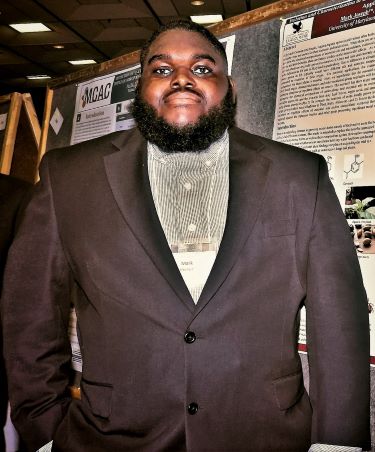
Sunday, December 15, 2019
The National Science Foundation had 2019 UMES alumnus Mark Joseph in mind when in 1991 it created the Louis Stokes Alliance for Minority Participation program to help the nation meet its science, technology, engineering, and mathematics (STEM) workforce needs.
Joseph, a Commonwealth of Dominica native, is a soft-spoken but intense young man who quietly excelled as one of UMES’ top STEM students during his undergraduate career.
He crossed the graduation stage Dec. 13 in the William P. Hytche Athletic Center with an impressive transcript; a near-perfect grade point average in pursuit of a bio-chemistry degree — earning him highest honors — and a slew of other credits, including an American Chemical Society award earlier this year as one of the nation’s top undergraduate physical chemistry students.
“I had a passion for chemistry,” Joseph said, “but I wasn’t sure it was my calling – until I came to UMES.”
As a member of the Richard A. Henson Honors Program, Joseph completed 45 credit hours of honors-approved classes, setting a university record. (The program requires all honors students to complete 24 credit hours in honors classes toward graduation.)
His capstone honors project was a report drawn from working in the lab of Dr. Anand Dhekney, an associate professor of genetics and plant breeding. Joseph assisted Dhekney in exploring ways to optimize a genome editing system for grapevines using “CRISPR/Cas9,” a cutting-edge research technique to breed new plant varieties.
“I found Mark to be a very smart and talented individual who was always eager to learn new techniques and apply them in his research project,” Dhekney said.
Joseph also worked as a research assistant in two other UMES laboratories, including two years under organic chemist Victoria Volkis, whom he respectfully calls an influential mentor.
Under Volkis’ guidance, Joseph conducted research on “essential oils in medicinal herbs, plants and algae” and their potential as safer, alternate applications for pest control.
Joseph worked for a pest-control company that uses the kind of traditional pesticides under increasing scrutiny, a hands-on experience that inspired him to look for natural insect repellents.
“People don’t like chemicals in their lives,” Joseph said. Essential oils he extracted from berries, holy basil and algae, he said, seem to be a natural alternative.
Volkis said Joseph proved an adept presenter at a series of prominent conferences she encouraged him to attend, including the Annual Biomedical Research Conference for Minority Students where in 2018 he was named “a winner of super prestigious first-place poster award.”
Joseph, who sports an Abraham Lincoln-style Shenandoah beard, spent 10 weeks in the summer of 2018 at Northern Illinois University working alongside classmate Taryn Jones in a competitive NSF-funded program known as the Research Experience for Undergraduates.
Joseph also took two trips abroad organized by the Henson honors program; one a service-learning excursion to the Dominican Republic and the other a cultural-emersion tour of Italy.
Underclassmen knew to seek him out as tutor.
“I love giving back,” he said.
Mark plans to spend 2020 shadowing physicians at hospitals and clinics as well as working as a nursing home volunteer while studying for medical school entrance exam.
“He’s a very smart student,” Volkis said. “He has a huge potential as a graduate student.”
His goal is to be a cardiac surgeon.

